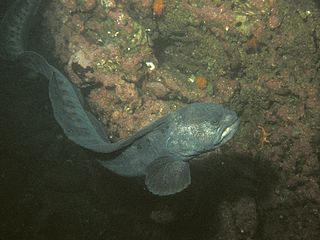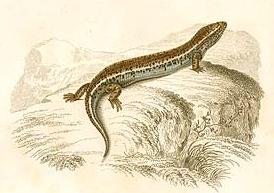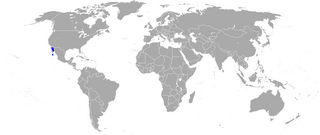
The oscar is a species of fish from the cichlid family known under a variety of common names, including tiger oscar, velvet cichlid, and marble cichlid. In tropical South America, where the species naturally resides, A. ocellatus specimens are often found for sale as a food fish in the local markets. The fish has been introduced to other areas, including India, China, Australia, and the United States. It is considered a popular aquarium fish in Europe and the U.S.

Ovalipes ocellatus, known as the lady crab, is a species of crab from eastern North America. Other names for it include the leopard crab or Atlantic leopard crab due to the leopard-like rosette patterns on its shell, the calico crab, or ocellated crab. It has a shell 3 in (7.6 cm) long and only slightly wider, which is covered in clusters of purple spots. It occurs from Canada to Georgia, and lives mainly on molluscs, such as the Atlantic surf clam.
The red drum, also known as redfish, channel bass, puppy drum, spottail bass, or simply red, is a game fish found in the Atlantic Ocean from Massachusetts to Florida and in the Gulf of Mexico from Florida to northern Mexico. It is the only species in the genus Sciaenops.

Smerinthus ocellatus, the eyed hawk-moth, is a European moth of the family Sphingidae. The species was first described by Carl Linnaeus in his 1758 10th edition of Systema Naturae.

The rosy bitterling or Tairiku baratanago is a small freshwater fish belonging to the family Cyprinidae (carp), native to East Asia from the Amur River basin to the Pearl River basin.

The wolf eel is a species of wolffish (Anarhichadidae) from the North Pacific. It is monotypic within the genus Anarrhichthys and one of only two genera in the family, the other being Anarhichas.

Hyperolius ocellatus is a species of tropical West African frog in the family Hyperoliidae, that is split into the subspecies H. o. ocellatus and H. o. purpurescens. It is found in Angola, Cameroon, Central African Republic, Republic of the Congo, Democratic Republic of the Congo, Equatorial Guinea, Gabon, Nigeria, Uganda, and possibly Rwanda. Its natural habitats are subtropical or tropical moist lowland forests, rivers, intermittent freshwater marshes, freshwater springs, rural gardens, heavily degraded former forest, ponds, and canals and ditches.
The ocellated forest tree frog, Leptopelis ocellatus, is a species of frog in the family Arthroleptidae found in Cameroon, the Republic of the Congo, the Democratic Republic of the Congo, Equatorial Guinea, and Gabon, and possibly Angola and the Central African Republic. Its natural habitats are subtropical or tropical moist lowland forest, swamps, and heavily degraded former forests. It is threatened by habitat loss.
Liuixalus ocellatus is a species of frog in the family Rhacophoridae. It is endemic to the Hainan Island, China.

The ocellated poorwill is a species of nightjar in the family Caprimulgidae. It is found in Argentina, Bolivia, Brazil, Colombia, Costa Rica, Ecuador, Honduras, Nicaragua, Paraguay, and Peru. Its natural habitats are subtropical or tropical moist lowland forests and subtropical or tropical moist montane forests.

The marbled frogmouth is a bird in the family Podargidae. The species was first described by Jean René Constant Quoy and Joseph Paul Gaimard in 1830. It is found in the Aru Islands, New Guinea and Queensland. Its natural habitats are subtropical or tropical moist lowland forest and subtropical or tropical moist montane forest.

Dorothy's slender opossum is a species of opossum in the family Didelphidae. It is found in Brazil and Bolivia. It is threatened by habitat loss.

Chalcides ocellatus, or the ocellated skink is a species of skink found in Greece, southern Italy, Malta, and parts of northern Africa. UAE, Israel, It is also found in Pakistan, India and Sri Lanka.

The ocellated turbot is a flatfish of the family Pleuronectidae. It is a demersal fish that lives on bottoms at depths of between 1 and 140 metres. Its native habitat is the subtropical waters of the Eastern Pacific, specifically southern Baja California and the upper Gulf of California ; it is the only member of the genus to prefer subtropical waters. It can grow up to 24 centimetres (9.4 in) in length.

The goldspotted eel, also known as the goldspotted snake eel or the dark-spotted snake eel, is an eel in the family Ophichthidae. It was described by Charles Alexandre Lesueur in 1825, originally under the genus Muraenophis. It is a marine, tropical eel which is known from the western and eastern Atlantic Ocean, including Bermuda, southern Florida, USA; the Bahamas, Santa Catarina, and Brazil. It dwells at a maximum depth of 15 metres (49 ft), and inhabits rocky and coral reefs. Males can reach a maximum total length of 110 centimetres (3.6 ft).
Tragocephalini is a tribe of longhorn beetles of the subfamily Lamiinae. It was described by James Thomson in 1857.
Dinocephalus alboguttatus is a species of beetle in the family Cerambycidae. It was described by Stephan von Breuning in 1958.

Dinocephalus ornatus is a species of beetle in the family Cerambycidae. It was described by Louis Péringuey in 1899. It is known from Tanzania, Mozambique, Somalia, Malawi, South Africa, Ethiopia, and Zambia. It contains the varietas Dinocephalus ornatus var. nigroannulatus.

Cetoscarus ocellatus, common name Spotted parrotfish, is a species of parrotfish belonging to the family Scaridae.
The ocellate soapfish is a species of marine ray-finned fish with a wide Indo-Pacific distribution. It is the only species in the genus Grammistops. It is also known as the ocellated soapfish, ocellated podge, or false-eyed soapfish. The specific name ocellatus refers to the ocellate (eye-like) spot on the operculum.













